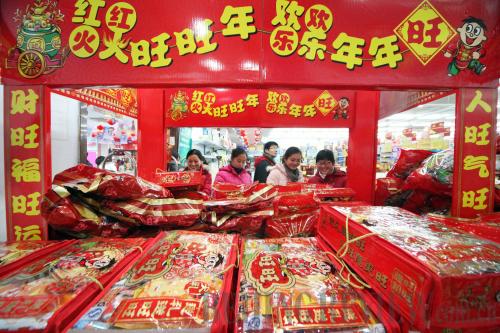|
 |
|
GOOD LOOKS: Shoppers are surrounded by beautifully packed goods in a supermarket before the 2011 Spring Festival (XINHUA) |
Unscrupulous Pricing
China's National Development and Reform Commission (NDRC) recently said there was fraudulent conduct, such as fictitious original prices, misleading pricing labeling, in the operations of a number of chain stores of Carrefour and Wal-Mart in some cities. NDRC has asked local pricing authorities to correct the situation and impose fines.
Given the development history of the two companies, previously price fraud was not the tactic that pushed them to business success. So why has it happened in China?
For a long time, Carrefour and Wal-Mart have been provided with favorable policies and they do not have competitors to match them in China. Such a favorable business environment is making them increasingly arrogant. Meanwhile, the high cost of safeguarding consumers' rights deters individual consumers from taking action to protect their own rights.
The fact these global business giants cheat when there is a chance to increase their profits shows an effective supervision system is urgently needed to safeguard consumers' rights. A market that neglects or even stamps on consumers' rights will inevitably lead to a prevalence of dubious tactics.
Beijing Times
Wasteful Packaging
During the Spring Festival period, almost all supermarkets and stores are filled with colorful commodities. Even a small piece of candy is packed in one piece of paper after another.
Because beautifully packed commodities more easily had access to markets, packaging was hailed in earlier days. Later, it was found packaging was being overdone, resulting in pollution and waste of resources. However, despite stronger opposition to excessive packaging, manufacturers keep doing so in order to make bigger profits.
As for consumers, packaging is only useful when a commodity is presented as a gift. But some packaging materials do not actually meet basic requirements for hygiene or safety. Businesses argue elaborate packaging is demanded by consumers. The reality is, except for some made-to-order products demanding fancy packaging, consumers are forced to accept expensive excessively packaged commodities.
The 12th Five-Year Plan (2011-15) made energy saving and resource conservation leading priorities, but over-packaging obviously acts against the target. Maybe it's time to take tough measures to restrain irresponsible profit-driven businesses from over-packaging.
People's Daily
Expensive Training
A plan of official retraining is being implemented in Ruzhou in central China's Henan Province. Accordingly, more than 600 officials will be sent to prestigious domestic universities for training. This is on top of the 159 officials who already each undertook a week's public administration training at Tsinghua University during 2010. Since then, the local government of county-level Ruzhou has begun to set aside 3 million yuan ($447,000) every year to pay for the tuition.
Is it right for government to make a unilateral decision on how to spend such a huge amount of money? Based on last year's experience, the spending on the education of the officials will amount to about 5.3 million yuan ($803,000). Does it have permission from local taxpayers? Besides, what kind of useful governance techniques can officials learn in one week?
Isn't this spending adding to local people's burdens? Due to the lack of an effective supervisory system to ensure the transparency of government expenses, officials in some places have never thought about how to do their jobs with minimum spending. This has resulted in swelling government expenses. In Ruzhou's case, the local authority had not presented convincing reasons to the public before it decided on the huge financial expenditure.
Xinhua Daily Telegraph
Mere Entertainment
In response to the rocketing box office for domestic movies, the State Administration of Radio, Film and Television recently warned box office figures should not be everything and more needs to be done to improve the quality of domestic movies.
In today's society, commercial principles are prevailing in various areas, including the production of movies. Filmmakers, in order to maximize profit margins, have to bend down to commercial demands. Now it's time to ponder whether this practice is depriving films of disseminating culture. In the past, movies tended to offer enlightening lessons for life, but today movies risk being reduced to be tools for entertainment. Originally, as items of widely accepted art, movies were supposed to show objectively pictures of reality and reveal the nature of society and life, but not just be something to kill time.
The excessive pursuit of commercial success is doomed to impair cultural levels and people's taste in movies. If we don't want our domestic movies to slip into the trap of being mere entertainment, it's really necessary to think about the nature of the movies.
Workers' Daily | 